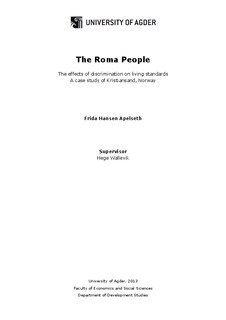| dc.description.abstract | The Roma people are one of the largest minority groups in Europe and also the least integrated one. Due to discrimination and exclusion in their home countries, many Roma choose to migrate to countries such as Norway to earn money, primarily through begging. This thesis stems from a desire to learn more about the living standards of Roma people in Kristiansand and to find out what effect long-term discrimination has had on their lives. In this thesis empirical findings from an interview based qualitative study of 24 Roma informants as well as seven representatives from the support system are presented. The support system includes Christian organizations, churches, a politician from the political party Venstre and private people. Findings are discussed with reference to literature related to living standards of Roma, discrimination against them and policies implemented to reduce discrimination towards this people. I also focus on discussing findings with reference to research on the new poverty, links between discrimination, exclusion and poverty, as well as migration, development and poverty, which also include push and pull factors. In this thesis I argue that Roma’s living standards are heavily impacted by the long-term discrimination and exclusion they have experienced. What is interesting is that in general literature on the Roma people argue for an understanding of Roma as discriminated against and the people supporting Roma in Kristiansand also perceive them to be discriminated against. The Roma people in my study, however, claim that they do not feel discriminated against. One potential cause is that the situation for Roma in Romania is experienced as worse than in Kristiansand. The effects of the efforts that have taken place towards the Roma people in Kristiansand may also contribute to their feeling of not being discriminated against in this particular city. Services provided for in Kristiansand, mainly the sanitation facility and the access to the Salvation Army’s welfare center, have enabled Roma to meet daily needs; access to a toilet and a shower facility and access to food and clothing. The support system perceives the services provided for to have worked as intended and that these measures have reached poor people in need and helped increase living standards and well-being. And Roma agree to such an understanding. Having said so, my findings indicate that hierarchical structures within the Roma community in Kristiansand may have an impact on how Roma experience their stay in Kristiansand, access to and use of the sanitation facility and the ability to generate money. Thus beyond the services provided for there are challenges which complicate the picture of how Roma experience being and living in Kristiansand. | no_NO |
